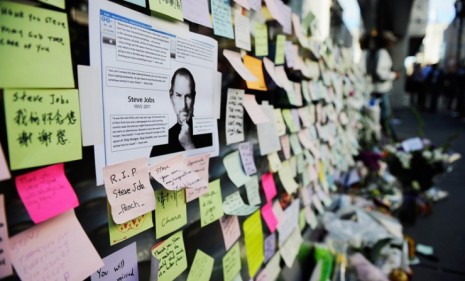Steve Jobs' death: Is the world overreacting?
Everyone agrees: He created great gadgets. But, some note, he didn't cure cancer, end apartheid, or bring about the fall of communism

A free daily email with the biggest news stories of the day – and the best features from TheWeek.com
You are now subscribed
Your newsletter sign-up was successful
Since Steve Jobs' death Wednesday night, emotional tributes have been pouring in, proclaiming how the Apple co-founder changed the world and revolutionized computing, capitalism, and the way we consume media. But while fanboys weep and the media pontificates, some are wondering if we're going overboard and mourning a CEO as if he were a saint. Are all the tributes and tears too much?
He wasn't Jesus: "Calm down people," says Hamilton Nolan at Gawker. "A tech genius has passed on," and it's a "devastating loss to Steve Jobs' close friends and family members, as well as to Apple executives and shareholders." The rest of us need to get a grip and save the grandiose displays of public grief for those great figures who have unselfishly worked to cure disease, end wars, or fight poverty. Yes, Apple products are cool, but "they are not heroes, and neither is their creator, no matter how skilled he may have been."
The Week
Escape your echo chamber. Get the facts behind the news, plus analysis from multiple perspectives.

Sign up for The Week's Free Newsletters
From our morning news briefing to a weekly Good News Newsletter, get the best of The Week delivered directly to your inbox.
From our morning news briefing to a weekly Good News Newsletter, get the best of The Week delivered directly to your inbox.
And he didn't necessarily improve our lives: "Those who think that Steve Jobs was in the same league" as Einstein or Nelson Mandela "should switch off their computers and get out more," says A.N. Wilson in the Daily Mail. In an age where many of us are tethered to our gizmos, unable to function if we can't check our email, has all this gadgetry changed our lives for the better? I'll admit that "Jobs was a brilliant and highly innovative technician, with great business flair and marketing ability... a clever backroom boy who got lucky," but he wasn't a true visionary. He didn't fundamentally change the world.
"Brilliant, yes, but he wasn't an Einstein"
He wasn't a saint, but he was a visionary: "Steve Jobs was a genius, and one of the most important businessmen and inventors of our time," says D.B. Grady at The Atlantic. "But he was not a kindly, soft-spoken sage who might otherwise live atop a mountain in India, dispatching wisdom to pilgrims." There's no need to canonize Jobs. He "didn't change the world by playing nice." He changed the world by being a demanding, "iron-fisted visionary," but that's often what it takes to bring great things to market. Jobs "doesn't deserve a hagiography, and I doubt he would have wanted one."
A free daily email with the biggest news stories of the day – and the best features from TheWeek.com
-
 Why is the Trump administration talking about ‘Western civilization’?
Why is the Trump administration talking about ‘Western civilization’?Talking Points Rubio says Europe, US bonded by religion and ancestry
-
 Quentin Deranque: a student’s death energizes the French far right
Quentin Deranque: a student’s death energizes the French far rightIN THE SPOTLIGHT Reactions to the violent killing of an ultraconservative activist offer a glimpse at the culture wars roiling France ahead of next year’s elections
-
 Secured vs. unsecured loans: how do they differ and which is better?
Secured vs. unsecured loans: how do they differ and which is better?the explainer They are distinguished by the level of risk and the inclusion of collateral